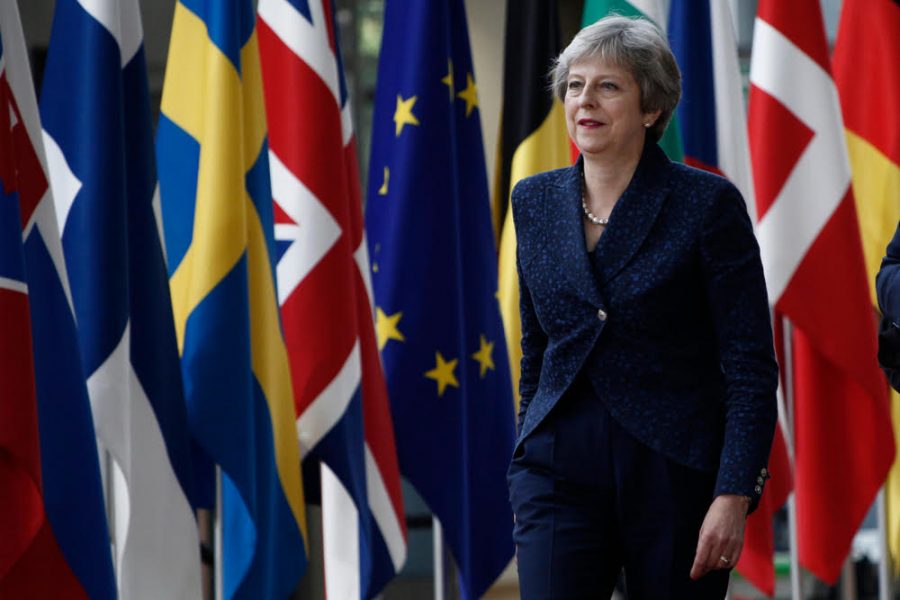The International Corner: Challenges of the Brexit Deal [Opinion]
Brussels, Belgium on Jun. 28, 2018. Prime Minister of the UK, Theresa May arrives for a meeting with European Union leaders. – Image
Published: April 23, 2019
The European Union has been in existence since the 90’s, and since its inception it has been challenged by many different people and countries. Great Britain and its people have been notably uncertain about its membership in the organization since it joined the European Economic Community, the precursor to the EU, and there have been many membership referendums held after the country joined in 1973. In 2016, Theresa May called for another referendum on the UK’s membership in the EU. The part of the British population that wanted to leave won by over a million voters.
The vote in 2016 didn’t call for an immediate separation between the UK and EU. We would have to wait three years for the actual decision to take effect. In the meantime, Theresa May’s Labour Party negotiated with the EU and its member countries about the terms of the split. This withdrawal deal has a great deal of difficulty in parliament, as the Labour party cannot get a majority vote to pass the deal.
A major point of contention would be the border between Northern Ireland and Ireland. Northern Ireland is part of Britain. Ireland proper is a member of the EU and with this new deal the border between it and Northern Ireland would become an actual border with fences and checkpoints. Currently there is only a sign stating that you are entering Northern Ireland. The renewed border could reignite decades long tensions between the Protestants in the north and the Catholics in Ireland. Hostilities were ended with the Good Friday agreement in 1998. One of the major parts of the agreement was eliminating the hard border between Ireland and Northern Ireland. It is unclear how the Labour Party will get around the agreement to reach its goal of brexit.
An immediate consequence of Brexit would be the hit that the UK would take without the benefits of trade that an EU membership brings. Trade with EU countries is easier and more cost effective than trading outside it, a there is less paperwork and the open customs make trade quicker. The break up with the EU could also likely cause a crash in the global stock market. Britain is one of the financial centers of the world. Another likely immediate consequence would be that everything would rise in price. The UK gets the majority of its food imports from EU countries, along with many other items such as medicine and electronics.
With all of the possible consequences that Brexit may bring, the Labour Party and Parliament have sought to extend the deadline of when the referendum goes into effect. On April 10th Prime Minister Theresa May announced an extension of the Brexit deadline until October 31st 2019. Many in parliament feel that Theresa May will never fulfill her promises that she has made regarding Brexit, since by the time referendum is set to go in effect she will step down from office.
The European Council Head Donald Tusk has been the main negotiator with the UK. He feels that the British should “cancel Brexit altogether”. He has a point; in 2016 May made the promise of making the referendum’s results happen. She has failed to deliver on her promise, and along with her inability to orschrate the deal parliament has changed its mind. So canceling the deal might be the best thing. Britain can’t afford to suffer the effects that leaving the EU will bring.





![2024 Graduation [Photo Gallery]](https://FHNtoday.com/wp-content/uploads/2024/06/IMG_5917-300x200.jpg)
![Class of 2024 Wave Goodbye at the Senior Wave [Photo Gallery]](https://FHNtoday.com/wp-content/uploads/2024/05/IMG_9048-300x200.jpg)

![Seniors Attend Senior Breakfast and Graduation Practice [Photo Gallery]](https://FHNtoday.com/wp-content/uploads/2024/05/IMG_0169-300x200.jpg)
![The 2024 Senior Class Conducts A Wedding Ceremony [Photo Gallery]](https://FHNtoday.com/wp-content/uploads/2024/05/IMG_1213-300x200.jpg)